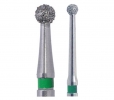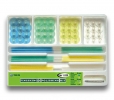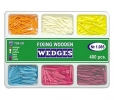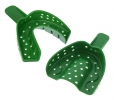STATEMENT OF PROBLEM
A common complication in implant dentistry is unintentional implant screw loosening. The critical factor in the prevention of screw loosening is the delivery of the appropriate target torque value. Mechanical torque-limiting devices (MTLDs) are the most frequently recommended devices by the implant manufacturers to deliver the target torque value to the screw. Two types of MTLDs are available: friction-style and spring-style. Limited information is available regarding the influence of device type on the accuracy of MTLDs.
PURPOSE
The purpose of this study was to determine and compare the accuracy of spring-style and friction-style MTLDs.
MATERIAL AND METHODS
Five MTLDs from 6 different dental implant manufacturers (Astra Tech/Dentsply, Zimmer Dental, Biohorizons, Biomet 3i, Straumann [ITI], and Nobel Biocare) (n=5 per manufacturer) were selected to determine their accuracy in delivering target torque values preset by their manufacturers. All torque-limiting devices were new and there were 3 manufacturers for the friction-style and 3 manufacturers for the spring-style. The procedure of target torque measurement was performed 10 times for each device and a digital torque gauge (Chatillon Model DFS2-R-ND; Ametek) was used to record the measurements. Statistical analysis used nonparametric tests to determine the accuracy of the MTLDs in delivering target torque values and Bonferroni post hoc tests were used to assess pairwise comparisons.
RESULTS
Median absolute difference between delivered torque values and target torque values of friction-style and spring-style MTLDs were not significantly different (P>.05). Accuracy of Astra Tech and Zimmer Dental friction-style torque-limiting devices were significantly different than Biohorizons torque-limiting devices (P<.05).
CONCLUSIONS
There is no difference between the accuracy of new friction-style MTLDs and new spring-style MTLDs. All MTLDs fell within ±10% of the target torque value. Astra Tech and Zimmer Dental friction-style torque-limiting devices were significantly more accurate than Biohorizons (C) torque-limiting devices (P<.05); however, all the torque-limiting devices fell within ±10% of the target torque value preset by the manufacturers.
Source: PMID: 26119016 PubMed - in process





